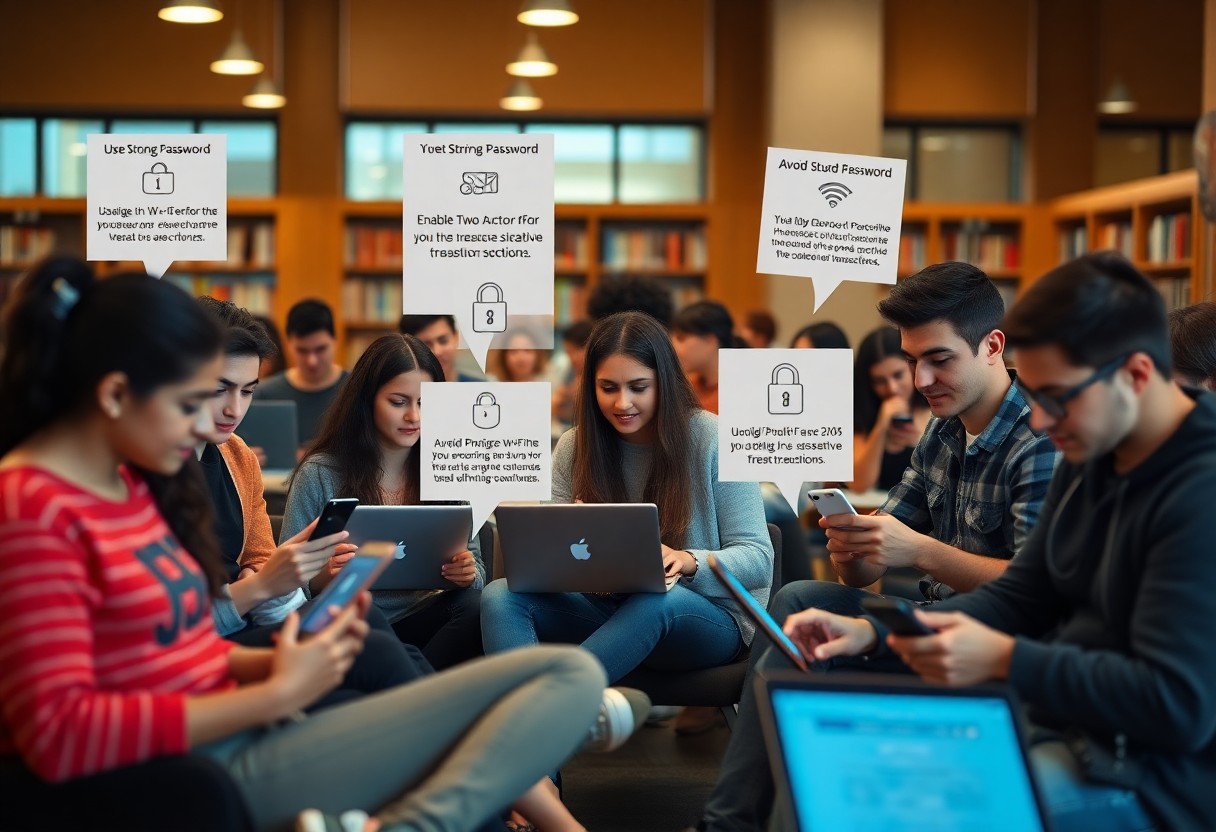Many college students find themselves at a higher risk of online hacking due to their lack of cybersecurity awareness and a lifestyle that often prioritizes convenience over safety. With frequent use of public Wi-Fi, sharing personal information on social media, and weak password practices, you may unwittingly invite online threats. Additionally, hackers see college students as prime targets because many of you have limited financial resources yet could still hold valuable data. Understanding these vulnerabilities is vital for protecting your personal information and digital assets.
Key Takeaways:
- College students often have limited cybersecurity awareness, making them more vulnerable to phishing attacks and other online scams.
- Many students use unsecured public Wi-Fi networks, which can facilitate data breaches and unauthorized access to personal information.
- The frequent sharing of personal information on social media platforms increases the risk of identity theft and targeted attacks by cybercriminals.
The Digital Footprint of College Life
Your digital footprint expands significantly during your college years, shaped by the various online activities and interactions you engage in. From social media to online learning platforms, each click, like, and comment contributes to a trail of data that can be exploited if not managed carefully. This footprint not only reflects your academic pursuits but also your social life, personal interests, and even your financial habits, making it a goldmine for potential hackers.
Social Media Usage Patterns
Your presence on social media platforms like Facebook, Instagram, and Snapchat can expose personal information that hackers can use to exploit you. With over 90% of college students using social media, sharing milestones, events, and even location data becomes a norm. Often, users inadvertently present a wealth of information, including your daily routines and connections, which can be leveraged for targeted attacks.
Online Learning and Resource Access
Utilizing online learning platforms and digital educational resources provides convenience, but it also raises security concerns. As you log into various websites to access coursework, your login credentials and sensitive academic data risk exposure. This access often requires personal information, which can be siphoned off by hackers through phishing attempts or data breaches.
The wide use of platforms like Canvas and Zoom for online classes has made it easier to share sensitive information with professors and peers. In fact, a study found that 67% of students use school-issued devices for accessing academic resources, which can lead to compromised security if these devices are not adequately protected. Ensure you’re using strong, unique passwords and multi-factor authentication whenever possible, as these measures can significantly reduce the likelihood of unauthorized access to your online accounts.
Vulnerabilities of Campus Networks
Campus networks often harbor a multitude of security vulnerabilities that can easily be exploited by hackers. The sheer volume of devices connected to campus networks, combined with varied operating systems and user practices, creates a fertile ground for cyber threats. Many institutions fail to keep software updated or patch vulnerabilities promptly, leaving students and faculty exposed to cyberattacks. Additionally, the lack of network segmentation means that a breach in one system could potentially compromise sensitive data across the entire network.
Public Wi-Fi Dangers
Using public Wi-Fi on campus can expose you to significant risks. Unsecured networks allow hackers to intercept your data, including passwords and personal information, without much effort. Connecting to an open Wi-Fi network can turn even a casual web browsing session into a security nightmare, as attackers can implement techniques like “man-in-the-middle” attacks, capturing your sensitive data before it reaches its intended destination.
Insufficient Cybersecurity Awareness
Your awareness of cybersecurity practices significantly impacts your online safety. Unfortunately, many college students lack basic knowledge about how to protect their digital identities. A 2022 survey revealed that just 30% of students felt confident in their cybersecurity knowledge, leading to risky behaviors such as using weak passwords or neglecting to enable two-factor authentication. Without proper training and awareness, you become an easy target for cybercriminals.
Insufficient cybersecurity awareness extends beyond personal responsibility; it reflects a systemic problem within educational institutions. Many colleges fail to implement comprehensive cybersecurity education programs, leaving students unaware of the threats they face daily. You might often find yourself navigating phishing scams, identity theft, or data breaches without the tools to recognize or prevent them. Regular workshops, informational campaigns, and easily accessible resources could significantly elevate students’ understanding of online security, fostering a more cyber-savvy campus community.
Financial Enticements: The College Student Profile
College students embody a unique blend of factors that make them particularly appealing targets for online hackers. With limited financial resources and a growing dependence on digital payments, you may inadvertently expose yourself to various cyber threats. Hackers recognize your *potential for financial gain*, considering the increasing amounts of money you may receive through student loans, part-time jobs, and even financial aid. The combination of inexperience in managing online transactions and the urgency of your financial needs creates an ideal scenario for phishing attacks and identity theft.
Unsecured Financial Information
Your financial information is often stored in unsecured environments, making you vulnerable to cyberattacks. Many students utilize shared Wi-Fi networks or unsecured connections to manage their finances, often forgetting to implement necessary security precautions. This lax approach can lead to hackers easily intercepting your personal and banking information, inadvertently granting them access to your funds and accounts.
Tolerance for Risk in Online Transactions
The tolerance for risk many college students exhibit when conducting online transactions contributes significantly to their vulnerability. Casual attitudes toward data security and a lack of thorough understanding of cybersecurity practices lead to careless behaviors, such as using simple passwords or failing to double-check the legitimacy of payment websites.
As a student, you likely prioritize convenience over security, particularly when managing bills, tuition payments, or online purchases. This inclination can lead to hastily entering personal information on unfamiliar or questionable websites. While the allure of cash back deals or exclusive student discounts may seem compelling, overlooking security measures or ignoring the signs of a possible scam can put your financial health at risk. By fostering a more vigilant approach to your online transactions, you can help safeguard your sensitive data and finances against potential threats.
Psychological Factors: Why Students Are Targeted
Students’ psychological attributes further amplify their appeal as targets for online hackers. The combination of their trusting nature, naivety, and a propensity for oversharing on social media creates a ripe environment for exploitation. Moreover, these factors can lead to poor decision-making regarding their online security practices. Recognizing the vulnerabilities stemming from these psychological traits is vital for implementing effective defenses against cyber threats.
Trusting Nature of Young Adults
The trusting nature of young adults makes them susceptible to phishing attacks and scams. Many students lack experience in identifying online threats, often assuming that emails from seemingly legitimate sources are safe. This naïveté can lead to divulging personal information or clicking on harmful links that compromise their data and accounts.
FOMO and Oversharing Habits
Feelings of FOMO (Fear of Missing Out) motivate students to overshare personal information online, inviting potential hackers to take advantage of their social media accounts. This constant urge to stay connected and portray an idealized lifestyle can lead to careless sharing of sensitive data, putting students at risk.
FOMO creates a compulsive need to be part of social media interactions, often resulting in hasty posts that reveal too much personal information. Students may frequently share their locations, study habits, and financial situations, which can be harvested by cybercriminals. For instance, a simple post about a night out can alert hackers to a student’s absence from their dorm, creating opportunities for physical theft or online intrusion. These oversharing habits leave you vulnerable to identity theft and fraud, as hackers can piece together your digital footprint from fragments of personal information dispersed across your social media platforms. Recognizing the implications of FOMO and curbing oversharing behaviors can significantly enhance your online security.
Practical Steps for Students to Protect Themselves
Adopting proactive measures can significantly enhance your online security. Start by educating yourself on common threats and integrating effective strategies into your daily digital practices. By staying vigilant and informed, you can create a safer online environment, reducing your likelihood of becoming a hacking victim.
Utilizing Strong Passwords and Two-Factor Authentication
Creating strong passwords is your first line of defense against unauthorized access. Use a combination of uppercase and lowercase letters, numbers, and symbols. Additionally, enabling two-factor authentication (2FA) provides an extra layer of security by requiring a second verification step, such as a text message code or authentication app, before logging in to your accounts.
Recognizing Phishing Attempts and Malicious Links
Phishing attempts often appear as legitimate emails or messages, tricking you into divulging personal information. Be wary of emails requesting sensitive data or prompting you to click on unknown links. Always verify the sender’s address and look for signs of urgency or grammatical errors, which are common in phishing attacks.
Phishing tactics have evolved, making them increasingly sophisticated and challenging to detect. Cybercriminals often impersonate trusted institutions, like your university or banks, using official logos and formatting to gain your trust. A classic example includes spoof emails that mimic your school’s IT department, claiming there’s an urgent issue with your account and prompting you to click on a link. Such malicious links may lead you to fake login pages designed to capture your credentials. Always initiate contact through official channels to check the validity of any suspicious communications before taking action. Your vigilance could save you from potential identity theft and financial loss.
Summing up
The digital landscape makes you an attractive target for online hackers, given your extensive use of technology and often limited cybersecurity awareness. With a wealth of personal information stored online and a tendency to utilize unsecured networks, your vulnerabilities increase significantly. Being a part of college life, where the focus is often on academics and socializing, it’s imperative to prioritize your online security. By understanding these risks and taking proactive measures, you can better protect your sensitive data from potential threats.
Q: Why are college students considered easy targets for online hackers?
A: College students often lack awareness of cybersecurity risks and may not have the knowledge or resources to protect themselves online effectively. Many students use public Wi-Fi networks that are less secure, making it easier for hackers to intercept data. Additionally, students frequently access sensitive information, such as bank accounts and personal details, without using strong passwords or multi-factor authentication, which increases their vulnerability.
Q: What specific online behaviors put college students at risk for hacking?
A: College students often engage in risky online behaviors, such as sharing personal information on social media and clicking links in suspicious emails or messages. These habits can lead to phishing attacks, where hackers impersonate trusted sources to obtain sensitive information. Furthermore, students may download software or applications from unverified sources, increasing the chance of malware infection on their devices.
Q: How can college students protect themselves from online hackers?
A: To safeguard against online threats, college students should practice safe browsing habits, such as utilizing strong and varied passwords and enabling multi-factor authentication on accounts. They should also be cautious about the information they share online and skeptical of unsolicited emails and messages. Additionally, using a virtual private network (VPN) when accessing public Wi-Fi can enhance security and help protect their data from unauthorized access.



